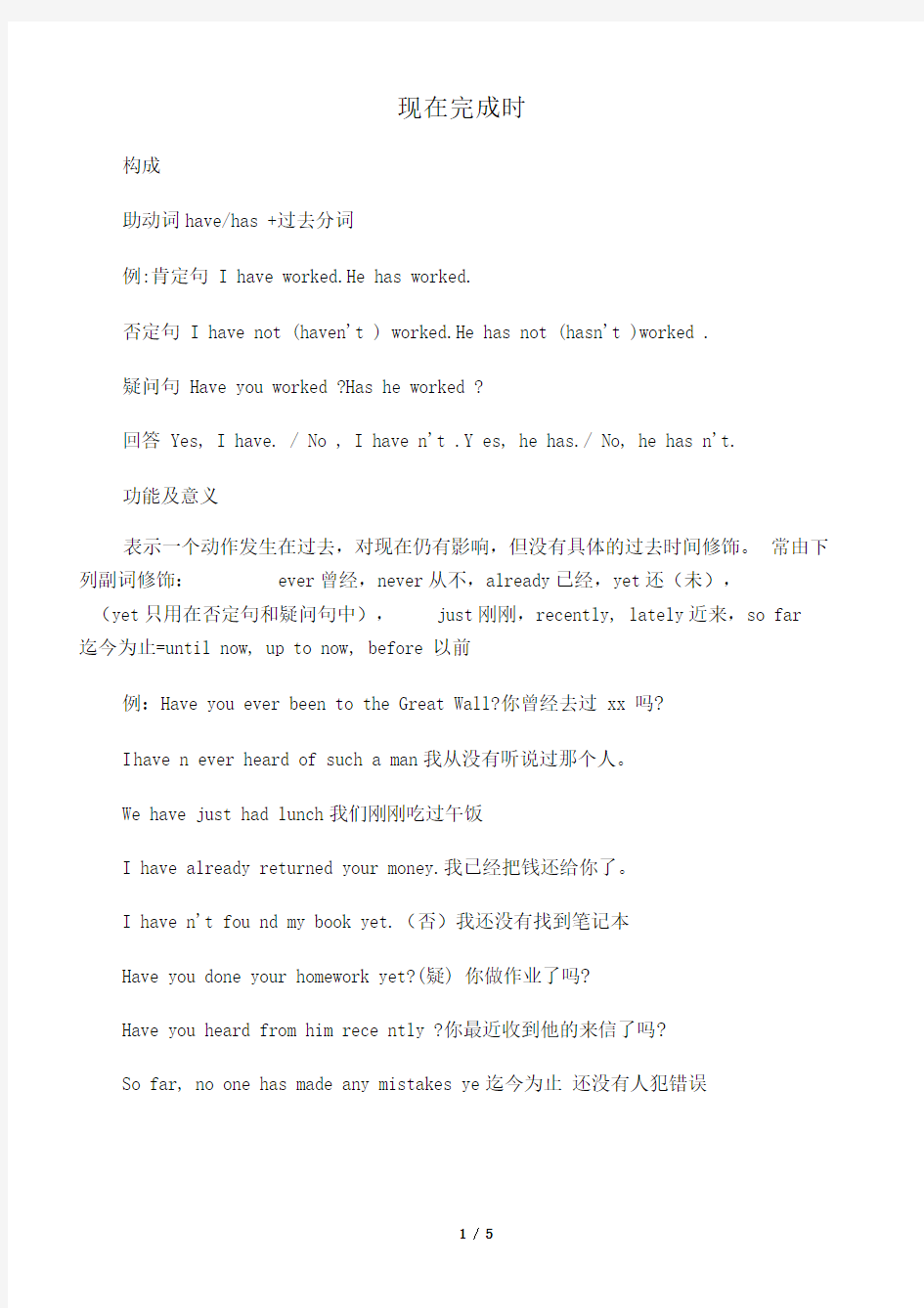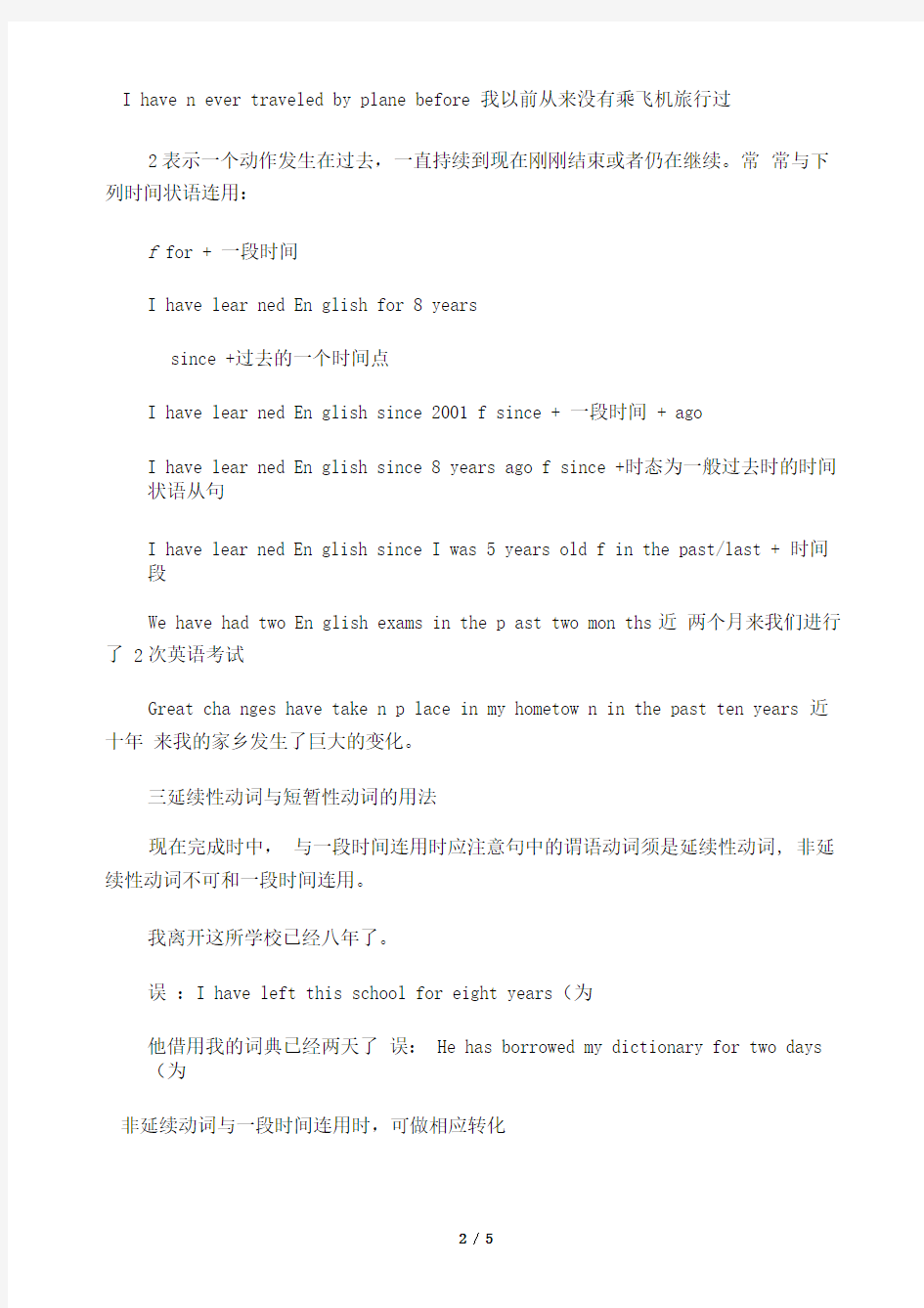

现在完成时
构成
助动词have/has +过去分词
例:肯定句I have worked.He has worked.
否定句I have not (haven't ) worked.He has not (hasn't )worked .
疑问句Have you worked ?Has he worked ?
回答Yes, I have. / No , I have n't .Y es, he has./ No, he has n't.
功能及意义
表示一个动作发生在过去,对现在仍有影响,但没有具体的过去时间修饰。常由下列副词修饰:ever曾经,never从不,already已经,yet还(未),
(yet只用在否定句和疑问句中),just刚刚,recently, lately近来,so far 迄今为止=until now, up to now, before 以前
例:Have you ever been to the Great Wall?你曾经去过xx 吗?
I have n ever heard of such a man我从没有听说过那个人。
We have just had lunch我们刚刚吃过午饭
I have already returned your money.我已经把钱还给你了。
I have n't fou nd my book yet.(否)我还没有找到笔记本
Have you done your homework yet?(疑) 你做作业了吗?
Have you heard from him rece ntly ?你最近收到他的来信了吗?
So far, no one has made any mistakes ye迄今为止还没有人犯错误
I have n ever traveled by plane before 我以前从来没有乘飞机旅行过
2表示一个动作发生在过去,一直持续到现在刚刚结束或者仍在继续。常常与下列时间状语连用:
f for + 一段时间
I have lear ned En glish for 8 years
since +过去的一个时间点
I have lear ned En glish since 2001 f since + 一段时间+ ago
I have lear ned En glish since 8 years ago f since +时态为一般过去时的时间
状语从句
I have lear ned En glish since I was 5 years old f in the past/last + 时间
段
We have had two En glish exams in the p ast two mon ths近两个月来我们进行了2次英语考试
Great cha nges have take n p lace in my hometow n in the past ten years 近十年来我的家乡发生了巨大的变化。
三延续性动词与短暂性动词的用法
现在完成时中,与一段时间连用时应注意句中的谓语动词须是延续性动词, 非延续性动词不可和一段时间连用。
我离开这所学校已经八年了。
误:I have left this school for eight years(为
他借用我的词典已经两天了误:He has borrowed my dictionary for two days (为
非延续动词与一段时间连用时,可做相应转化
因此中例句正确形式分别为
我离开这所学校已经八年了。
正 :I have been away from this school for eight years (
他借用我的词典已经两天了
正:He has kept my dictionary for two days(动
其它非延续性动词与时间段连用时的变形
buy T haveborrow T keep,
fall aslee p 宀be aslee pl eave 宀be away
begi n 宀be on die debd,
join T be 或be a member ofreturn 宀be back
T have a cold
marry 宀be marriedcatch a cold
在否定句中短暂性动词可与XX连用
I have n't gone to see him for several mon ths(我已经好几个月没有去看他了)
I have n't bought any thi ng for two mon ths
四区分
have been to + 地点;表示去过某个地方(已经回来),常与ever, never几次, 等连用
have gone to + 地点:表示到地方去了(还没回来)
have been in+地点:表示到了某个地方(多久了),常与for + xx连用
比较:He has been to China twice曾经去过,现在不在xx)
He has gone to China他到xx去了 .(他可能已在去xx的路上,或已到xx,总之,现在不在这里)
He has been in China for two years他至xx 已经两年了)
五对完成时的提问用how long?….?不能用when... ?
六现在完成时常用句型
1 It is the first/second time.…that.…结构中的从句部分,用现在完成时
It is the first time that I have visited the city
这是我第一次参观这座XX
It is the third time that the boy has bee n late
这是这个男生第三次迟到了
2This is the... that..结构,that从句要用现在完成时
This is the best film that I 've (ever) see n
这是我看过的最好的电影
This is the first time that r ve heard him si ng
这是我第一次听他唱歌
3It is / It has bee n + 时间段+ si nee ...
It has bee n/ It's 5 years since we last met.
自从上一次我们相遇到现在已经是五年了
It's / It has bee n 3 mon ths since the man died 那人死去 3 个月了
4 一段时间+完成时结构+ since引导的时间状语从句
Two years has p assed since I came here.
七现在完成时和一般过去时的区别
现在完成时表示过去发生的某一动作对现在造成的影响或结果,强调的是
现在的情况,所以它不能和表示过去的时间状语连用,女口yesterday, last night, three weeks ago, in 1998等。而一般过去时只表示过去的动作或状态,和现在不发生联系,它可以和表示过去的时间状语连用
I have seen the film我看过这部电影(我了解这部电影的内容)
I saw the film last week我上周看了这部电影(只说明sha ngx ingqi